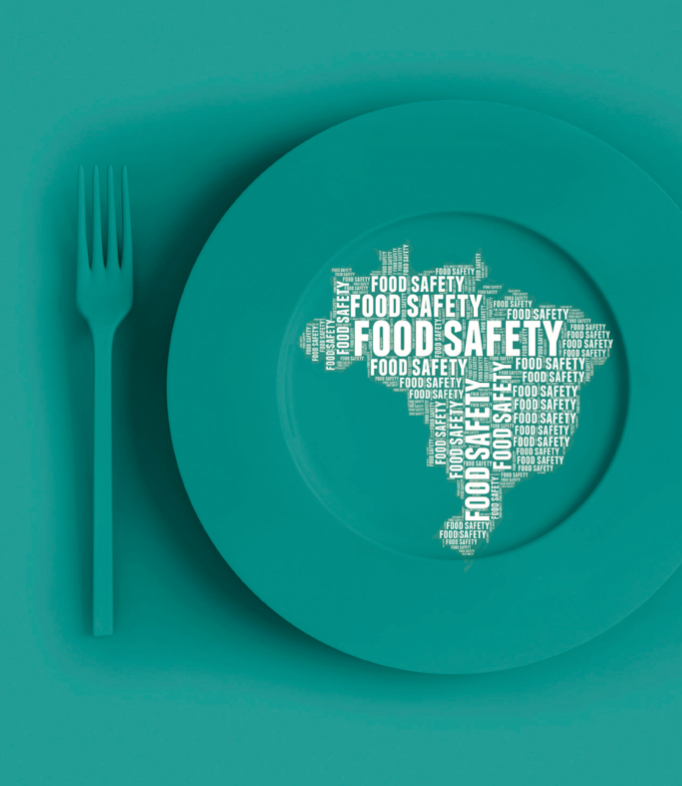
Food Safety Trends 2030
Brazil plays a crucial role in global food production, aiming to reach 600 million tons by 2050. However, food safety is vital and challenging, requiring adaptation in the face of changes in production chains. Management, which began in the 1960s with quality control systems, evolved into Hazard Analysis and Critical Control Points (HACCP) in the 1970s, focusing on threat prevention. In the 2000s, the need for a "Food Safety Culture" emerged. Currently, management involves institutions, standards, and systems to address challenges within organizational processes.
The study "Brazil Food Safety Trends 2030" predicts that food safety management will be significantly influenced over the next 10 years. Organic and plant-based foods, along with innovations such as cannabidiol and insect proteins, will play an important role. Non-conventional production systems like local production and urban farms are gaining prominence. In the field of information technology, functional genomics, IoT, and machine learning will be essential. Innovations such as active packaging and recycled materials, as well as distribution solutions, will also be a focus. Lastly, demographic changes and environmental challenges will be critical factors to consider.
Research Highlights
Since 1990, the Food Technology Institute (Ital) has shown concern for the future, focusing on analyzing new concepts to align its activities with social demands. The content about Food Industry 2030 was created to discuss nutrition practices, product safety, and social responsibility. Emphasizing food safety as a priority, Ital developed the Brazil Food Safety Trends 2030 study, mapping trends, outlining guidelines, and integrating areas of knowledge to offer a comprehensive view of the food context in the country.
“Unlike a technical book, Brazil Food Safety Trends 2030 offers a strategic approach to the future of food safety over the next decade, preparing us for a world in constant transformation and full of challenges,” said Eloísa Garcia, the study coordinator and general director of Ital.
After analysis, the study identified several critical transformations for the field of food safety, including emerging markets, non-conventional production systems and technologies, advances in information technology, and innovations in packaging and distribution systems.
Regarding macro trends, the research highlighted a broader scope of hazards and risks, increased complexity in management, the need for interdisciplinary governance approaches, the evolution of regulatory systems, and greater emphasis on food safety education and communication.
Transformations and challenges in food safety management
The challenges are driven by transformations such as climate change, resource scarcity, population growth, and shifts in consumer preferences. The complexity of supply chains and environmental restrictions add demands on multiple actors—from producers to food chain regulators. In the global context, challenges arise from new pathogens, accidental contaminants, and risks associated with consumer demands, such as “natural” minimally processed foods, online ordering, and 3D food printing. While advancements in science and technology provide opportunities to mitigate risks and critical points, they also bring new challenges, such as the need for training to operate this equipment. Given this reality, it is crucial to examine and implement stricter risk assessment systems and criteria in food production and commercialization. Understanding the increasing complexity of food safety for consumers is a responsibility shared by all stakeholders in the production chain.
About ITAL
Located in Campinas, São Paulo, the Food Technology Institute (Ital) conducts research, development, technical assistance, and knowledge dissemination in the areas of packaging, processing, preservation, and food and beverage safety. Founded in 1963 and linked to the São Paulo Agribusiness Technology Agency (Apta) under the State Secretariat of Agriculture and Supply, Ital has technical units specializing in other food and packaging segments. It is ISO 9001 certified, with part of its tests accredited under ISO/IEC 17025. Through the Plant-Based Protein Innovation Center, the Technological Innovation Hub, and the Technology Innovation Platform, Ital promotes strategic alliances for innovation and cooperation projects. It also offers a graduate program approved by Capes (Coordination for the Improvement of Higher Education Personnel).
Click here to download the full study.
Related Articles


